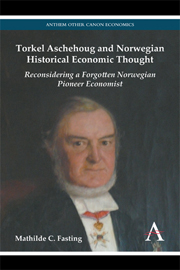 Torkel Aschehoug and Norwegian Historical Economic Thought
Torkel Aschehoug and Norwegian Historical Economic Thought Published online by Cambridge University Press: 05 March 2014
This book has endeavoured to analyse the economic thought of Torkel Aschehoug and to demonstrate that he represented the historical-empirical approach to economics. The reconstruction of his thought has revealed a complexity and sophistication that is rare among his contemporary Norwegian scholars.
Aschehoug's postscript was written in November 1908, only a few months before his death, and provides an overview of his work and thoughts. Aschehoug himself is best described as a reserved optimist. He believed in the power of education to strengthen ideas of equality and democracy, but he did not believe that education would eradicate the self-interested and egoistic tendencies of the human mind. Yet Aschehoug viewed the economic and cultural development on the verge of the twentieth century in an optimistic light, and he was confident that sound use of experience would be the best means of continuous, healthy development. And as the letter below shows, Aschehoug had no intention of quitting his work, despite the fact that his health was quickly deteriorating.
The following letter to Bohm-Bawerk, his last known written words, was composed just a few weeks before he died on 21 January 1909. The letter was never sent. Some words are illegible and their meaning has had to be guessed:
Dear Sir
It has been an exceedingly great pleasure for me to receive your amiable letter from the 26th of December [this letter cannot be found, and there are no traces of a preceding letter to Bohm-Bawerk from Aschehoug, so it might be suggested that Bohm-Bawerk was the one that wrote to Aschehoug in the first place] and the enclosed portrait of you.[…]
To save this book to your Kindle, first ensure [email protected] is added to your Approved Personal Document E-mail List under your Personal Document Settings on the Manage Your Content and Devices page of your Amazon account. Then enter the ‘name’ part of your Kindle email address below. Find out more about saving to your Kindle.
Note you can select to save to either the @free.kindle.com or @kindle.com variations. ‘@free.kindle.com’ emails are free but can only be saved to your device when it is connected to wi-fi. ‘@kindle.com’ emails can be delivered even when you are not connected to wi-fi, but note that service fees apply.
Find out more about the Kindle Personal Document Service.
To save content items to your account, please confirm that you agree to abide by our usage policies. If this is the first time you use this feature, you will be asked to authorise Cambridge Core to connect with your account. Find out more about saving content to Dropbox.
To save content items to your account, please confirm that you agree to abide by our usage policies. If this is the first time you use this feature, you will be asked to authorise Cambridge Core to connect with your account. Find out more about saving content to Google Drive.